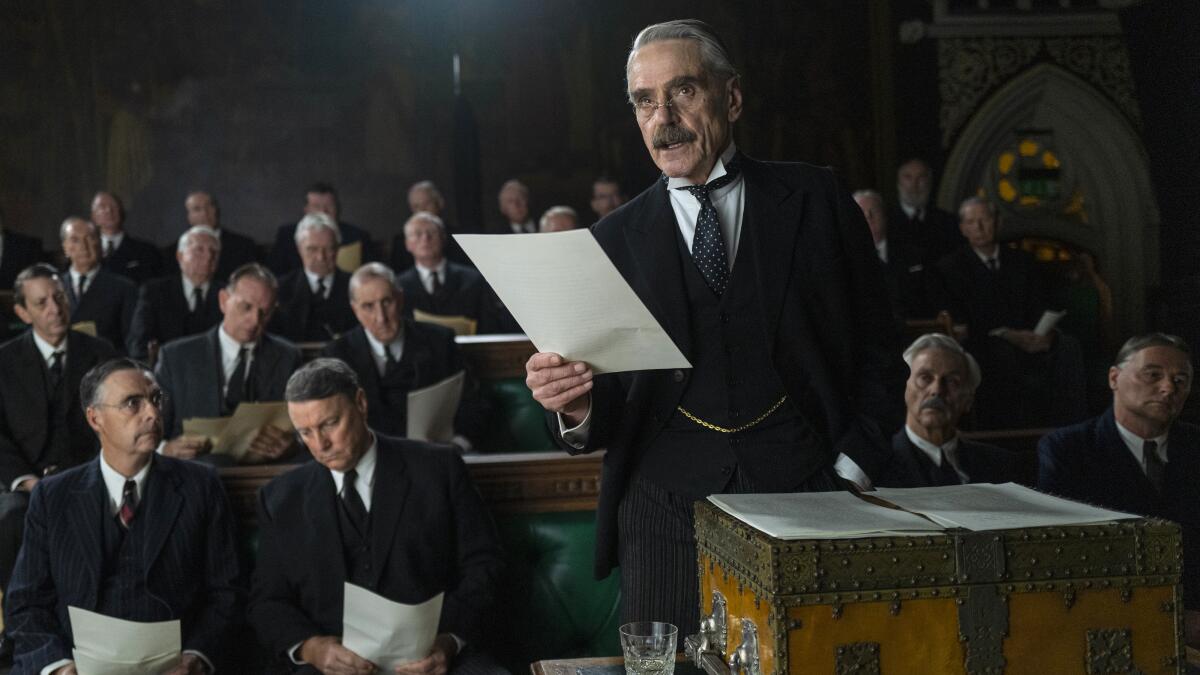Review: Scattershot filmmaking mars historical what-if ‘Munich — The Edge of War’

As the world watches to see if Russia invades Ukraine, it can sometimes feel like 1938 all over again, when there was much international handwringing over whether Hitler could be persuaded to avoid war over his designs to annex the Sudetenland in what was then Czechoslavakia.
Well, it actually is 1938 all over again in “Munich: The Edge of War,” a historical thriller surrounding the efforts of a worried England to do something — anything — about the gathering Nazi threat without triggering full-scale conflict. The movie reenacts those tense days when Britain’s Prime Minister Neville Chamberlain (Jeremy Irons) could hear the drums of war but sought peace on paper; he arranged a meeting in Munich with Hitler (Ulrich Matthes) to see if an agreement could be made to avoid bloodshed.
But the focus of “Munich: The Edge of War” — adapted from Robert Harris’ 2017 novel, and like many of his research-driven stories — isn’t on the names we know but instead author-invented inner-circle protagonists whose close-up view of the proceedings, as the facts and fictions unfold, carry the potential to change history.
In this case, it’s an Englishman and a German whose early-’30s university friendship soured over the era’s emerging political realities, but who years later reconnect as like-minded souls about the grave danger Hitler presents. The brief civil service career of Hugh Legat (George Mackay of “1917”) has already led him to the position of Chamberlain’s private secretary; MI6 sees an opportunity during the Munich trip for him to clandestinely accept top-secret information about Hitler’s true intentions from a well-connected German informant. That messenger turns out to be none other than Legat’s old Oxford chum Paul von Hartmann (Jannis Niewöhner), now a diplomat whose disillusionment has driven him to plot secretly with other Germans on how to get rid of Hitler.
It’s not the easiest task to draw effective suspense from historical events to which we know the outcome — a gold-standard example would be “The Day of the Jackal,” in which rich detail, clockwork plotting and dynamic filmmaking completely erase the inconvenient spoiler that Charles de Gaulle was obviously never assassinated. But “Munich: The Edge of War,” chaotically directed by Christian Schwochow, is an especially bad attempt. It wants to be a high-toned nail-biter, an important history lesson and a roiling friendship drama. But because Schwochow and screenwriter Ben Powers would rather jam the components together than braid them into a cohesive whole, the movie fails at all three, straining logic (especially the poorly handled spycraft) and flattening out the emotion at every turn.
Visually, it’s a mess. If your saturation level regarding agitated camerawork and purposeless cutting has been reached, “Munich” is especially punishing, ruining nearly every scene — a quiet or even loud conversation, a life-or-death bit of espionage — with the one-size-fits-all ersatz nerviness of Frank Lamm’s cinematography and Jens Klüber’s editing. And it does most of the actors no favors, although one is driven to imagine a better film built around the Hartmann character, since Niewöhner’s overcooked turn at least feels tethered to a believable edginess about what it must feel like to turn on one’s country. Mackay, on the other hand, is curiously unremarkable for being so central to the narrative. The female roles, meanwhile, barely register — particularly Jessica Brown Findlay’s what-about-me cliché of a wife to Legat and “Toni Erdmann” star Sandra Hüller’s thankless, underwritten co-conspirator of Hartmann’s.
Irons’ portrait of fatherly accommodation and stubbornness about peace, however, benefits from a natural fascination with Chamberlain as a long-disdained symbol of wrong-headed appeasement, and the fact that the movie is — as Harris’ book was — a measured reconsideration of the role he played in the run-up to World War II. Irons gives the kind of performance you want more of as a window into the psychology of leadership, so the fact that he has to share it in so disjointedly dull a slice of history as “Munich: The Edge of War” is regrettable.
'Munich: The Edge of War'
In English and German with English subtitles
Not rated
Running time: 2 hours, 9 minutes
Playing: Available Jan. 21 on Netflix
More to Read
Only good movies
Get the Indie Focus newsletter, Mark Olsen's weekly guide to the world of cinema.
You may occasionally receive promotional content from the Los Angeles Times.






